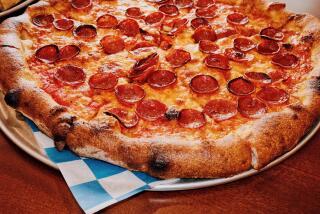Fatburger founder expanded South L.A. eatery into chain
Lovie Yancey, founder of the Fatburger restaurant chain, which began with a popular post-World War II hamburger stand in South Los Angeles, has died. She was 96.
Yancey, who had pneumonia, died Jan. 26 at Olympia Medical Center in Los Angeles, said her daughter, Gwen Adair.
Yancey had already operated a restaurant in Tucson and was living in Los Angeles in the late 1940s when she began thinking about launching a new food business.
“I settled on hamburgers because they were the fastest-selling sandwich in America,” she told the Wave newspaper in 1985.
Yancey launched her foray into fast food by partnering with Charles Simpson, who worked for a construction company and reportedly used scrap materials to build a three-stool hamburger stand on Western Avenue near Jefferson Boulevard.
Opened in 1947, the business was called Mr. Fatburger.
“The name of the store was my idea,” Yancey said. “I wanted to get across the idea of a big burger with everything on it . . . a meal in itself.”
In 1952, Yancey shed both her business partner and the “Mr.” in the hamburger stand’s name, and Fatburger was officially born.
“I think of that stand as like a little postwar survivor that’s a tribute to the entrepreneurial spirit of an African American woman who really did usher in what became a very good model for a franchise business,” Adriene Biondo, chairman of the Los Angeles Conservancy’s Modern Committee, told The Times on Friday.
From the beginning, Yancey was a fixture at the original Fatburger, where customers, who included entertainers such as Redd Foxx and Ray Charles, could custom-order their burgers.
“I worked 16, 17 and 18 hours a day behind the counter, seven days a week,” Yancey recalled in the 1985 interview. “I’d come home, catch a few hours of sleep and start all over again.”
Adair said her mother “was always there to make sure things were done properly. Even when she was older, she’d sit and talk to the people. That was her life; she loved being around the business.”
Yancey didn’t start out operating an open-all-night hamburger stand, she said in the interview, “but as word got out how good the food was, we started getting requests from night shift and early morning workers -- bus drivers, mailmen, street sweepers -- to stay open longer.”
In 1973, Yancey opened a Fatburger on La Cienega Boulevard in Beverly Hills, and it became a favorite destination for celebrity burger buffs.
“One night, there was some kind of awards [ceremony] and people came in limousines in their tuxes and everything,” recalled Adair.
“They just closed the door, because they couldn’t get any more people in there.”
Over the years, Fatburger has been immortalized in a string of songs, movies and TV shows, including the sitcom “Sanford and Son,” the film “The Fast and the Furious” and the Ice Cube single “It Was a Good Day.”
Fatburger even once made David Letterman’s Top 10 list for things he’d miss most about leaving Los Angeles.
In 1981, Yancey began offering franchises in what was billed as “The Last Great Hamburger Stand.”
By 1985, in addition to four company locations, there were 15 Fatburger franchise sites.
“I don’t worry about McDonald’s, Burger King or Wendy’s,” Yancey told the Wave.
“They may be more popular, but a good hamburger sells itself, and I don’t think anybody makes as good a hamburger as we do.”
For three consecutive years, beginning in 1985, Fatburger was named in Entrepreneur magazine’s annual Franchise 500 list.
Yancey sold her Fatburger company to an investment group in 1990 but retained control of the original property on Western Avenue.
The stand was never designated as a Los Angeles historical-cultural monument.
The property was sold last year, and Adair said the new owner plans to develop it.
Santa Monica-based Fatburger Corp., owned by Fog Cutter Capital Group, currently has 93 locations in the United States, Canada and Macao.
“We feel privileged to be part of the culture Lovie created,” Andy Wiederhorn, chairman of Fatburger, said in a news release.
Yancey, who was born in Texas on Jan. 3, 1912, established a $1.7-million endowment at City of Hope National Medical Center in Duarte in 1986 for research into sickle-cell anemia. This was in fulfillment of a promise to her 22-year-old grandson, Duran Farrell, who had died of the disease three years earlier.
In addition to her daughter, Yancey is survived by three grandchildren and five great-grandchildren.
The funeral will be held at 1 p.m. Monday at Angelus Funeral Home, 3875 S. Crenshaw Blvd., Los Angeles.
More to Read
Eat your way across L.A.
Get our weekly Tasting Notes newsletter for reviews, news and more.
You may occasionally receive promotional content from the Los Angeles Times.










